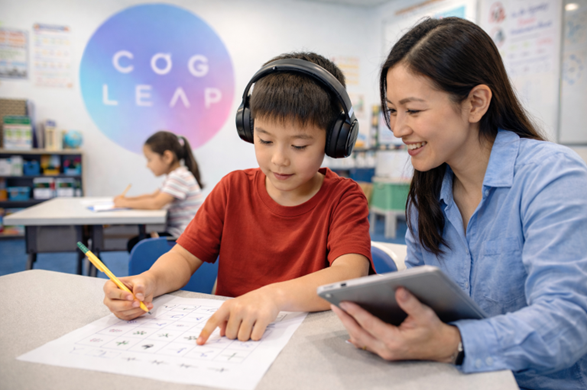Why Social Skills Matter: Helping Kids Build Confidence and Friendships
- zongqinpan
- Oct 24, 2025
- 3 min read
Updated: Oct 24, 2025

Introduction
Every parent wants to see their child happy, confident, and connected. Social skills—like sharing, listening, managing emotions, and making friends—are more than just “playground abilities.” They are the foundation for academic success, healthy relationships, and emotional resilience.
For children with ADHD, autism, behavioral challenges, or learning differences, social skills can sometimes feel harder to develop. But with the right support, every child can grow in confidence, communication, and connection.
At Cogleap, we believe all children deserve a safe, joyful place to practice social skills while building focus, learning strategies, and emotional balance.
What Are Social Skills and Why Do They Matter?
Social skills are the everyday tools kids use to connect with others. They include:
Communication: Expressing thoughts clearly, listening to others.
Cooperation: Sharing, waiting turns, and collaborating in groups.
Emotional Regulation: Managing frustration, celebrating wins, staying calm in conflict.
Problem-Solving: Working through disagreements, adapting to new situations.
When children develop these skills, they:
Form stronger friendships.
Gain self-confidence in school and group activities.
Handle stress and transitions more effectively.
Improve overall mental health and resilience.
The Unique Challenges Some Children Face
For children with ADHD, autism spectrum disorder (ASD), or behavioral needs, social skills don’t always come naturally. Challenges might include:
Impulsivity: Interrupting, acting without considering others’ feelings.
Attention Difficulties: Struggling to follow multi-step conversations or group games.
Anxiety: Avoiding social situations out of fear of rejection or embarrassment.
Sensory Differences: Becoming overwhelmed in noisy or crowded environments.
These are not weaknesses—they’re opportunities for growth. With the right guidance, kids can learn strategies that make social interactions feel less stressful and more rewarding.
How Strength-Based, Inclusive Programs Help
Traditional approaches often focus on “fixing” behavior. At Cogleap, our strength-based philosophy flips that perspective. Instead of focusing on what’s “wrong,” we highlight what children do well and build from there.
Our programs, like Move & Connect, integrate:
Play-based learning: Kids practice skills through games, music, and movement.
Peer interaction: Small groups encourage friendship-building in a safe space.
Emotional coaching: Staff help kids identify and manage feelings in the moment.
Non-medication strategies: We empower children through practical tools and activities.
This inclusive approach welcomes all children—whether they have ADHD, autism, behavioral needs, or no diagnosis at all.
Everyday Tips for Parents to Build Social Skills at Home
1. Practice Role-Playing
Pretend-play scenarios (“ordering at a restaurant,” “inviting a friend to play”) give kids low-pressure practice.
2. Encourage Team Activities
Sports, art projects, or group games teach cooperation and teamwork naturally.
3. Teach Emotional Language
Help your child put words to feelings: “I feel frustrated,” “I feel proud.” This builds emotional awareness and empathy.
4. Model Social Behavior
Kids learn by watching. Demonstrate saying thank you, apologizing, or offering help.
5. Celebrate Small Wins
If your child shares a toy, makes eye contact, or tries a new social activity, acknowledge it: “I noticed you waited your turn—that was kind and patient.”

Why Parents Choose Cogleap for Social Growth
Parents tell us they choose Cogleap because we:
Celebrate neurodiversity and welcome all children.
Provide joyful, engaging activities (music, movement, play).
Focus on confidence and connection as much as attention and learning.
Offer a non-medication alternative for growth.
Whether your child struggles with shyness, impulsivity, or making friends, our programs are designed to help them feel supported, understood, and capable.
Conclusion
Social skills are not just “nice to have.” They are essential for building confidence, friendships, and resilience. Every child deserves the opportunity to thrive socially, regardless of ADHD, autism, or behavioral challenges.
At Cogleap, we create inclusive, strength-based programs that help kids grow their focus, emotional balance, and social connections—in fun, non-medication ways.
Because when children learn to connect, they learn to thrive.

